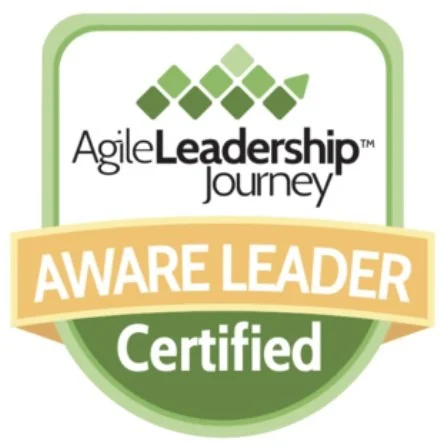A Holistic View of Organizational Health
Organisms flourish when their different biological systems are well functioning and in balance with each other.
Organizations flourish when their different groups are empowered and aligned with each other.
My workshops educate leaders and teams in agile ways of working that bring out the best in each other.
Online Leadership Agility Workshops
An online, interactive leadership-focused training to build skills and competencies to effectively guide and grow agile leaders and their organizations. This workshop is a pragmatic application of theory and provides concrete models, tools and techniques for leaders to employ directly in their own thinking, their own behaviors, and in leading their organizations.
The workshop is delivered in small cohorts (5-14 participants) for robust discussion and sharing. The cohort meets online every M/W/F for 4 weeks in short 90-min increments to focus on the topics listed below. In addition, each online session has ~30 mins of individual pre-work to prepare participants for the collaboration sessions.
The workshop is modularized into twelve sessions:
Workshop Kickoff & Agile Context: Navigate agility as a better risk-management strategy in complex, uncertain and rapidly changing environments.
Agile Leadership (Expert, Achiever & Catalyst): Identify your executive presence and bias, and a new journey to improve your leadership effectiveness.
Catalyst Leadership: Increase self-awareness, situational adaptability, and social effectiveness through enhanced leadership agility.
Catalyst Conversations: Improve any dialogue or meeting through more co-creative and balanced engagements with others.
Catalyst Feedback: Role-model giving and receiving effective feedback to increase status, creativity, autonomy, relatedness and fairness (SCARF).
Catalyst Habits: Challenge your biases and create new focus and behavior habits to be more strategic, influential and impactful within the organization.
Organizational Culture: Explore the unique organizational values and biases inhibiting and enabling agile ways of working in your organization.
Agile Organizations: Differentiate outside-in and inside-out approaches toward agility and why most agile scaling approaches fail to sustain organizational effectiveness.
Shaping Culture for Agility: Deconstruct and design culture-shaping changes for your organization through new structures, policies and measures.
Leading Change & Transitions: Navigate the system and human impacts of change and how to effectively lead healthy and effective transitions that stick.
Catalyst Canvas: Focus, align and accelerate changes in the organization through a simple, yet powerful brainstorming canvas.
Lean Coffee & Next Steps: Deep dive into additional topics and define actionable steps to improve yourself and your organization.
Participants graduating from this workshop will be certified through the Agile Leadership Journey.
Online Agile Team Workshops
An online interactive team-based training to learn agile and effectively apply Scrum in a remote team setting. Teams complete this program with both knowledge and the action plan to carry forward including a team structure and remote working agreement, quarterly release plan, and their first sprint plan.
The workshop is delivered in small groups (9-18 participants) organized into teams (5-9 participants each).The curriculum is organized in 10 learning modules and can be scheduled to meet client needs. Typical schedule is 1 session a day (MTWTF) for 2 weeks or 2 sessions a day (MTWTF) for 1 week.
The workshop is modularized into ten sessions:
1. Agile Context: Navigating Uncertainty with an Agile Mindset
Navigating Complexity - Recognizing when complicated problems become complex
Resolving complex problems requires a different approach
Agile Mindset - The four principles that support this way of thinking about work
2. Scrum Overview: Scrum as a way of practicing agile ways of working
Origins of Scrum - Background and early fundamentals of Scrum
Scrum Illustrated - high level summary of how Scrum works
Scrum with Remote Teams - Growing need for geographically dispersed Scrum teams
3. Scrum Team: Scrum is a Team Sport
Roles - The individual roles and responsibilities on a Scrum Team
Remote Scrum Teams - Remote considerations to the roles and responsibilities
4. Backlog: Focusing on Customer Value
Team Backlog - Guiding Scrum Teams with desired outcomes instead of outputs
User Stories - Representing customer value as backlog items
Acceptance Criteria - Defining success without specifying the solution
Remote Scrum Teams Considerations - Virtual instead of physical backlogs
5. Backlog Sizing: Estimating Backlog Items
Why size at all? - Is this a necessary evil for our team and business?
User Story Points - Sizing an unspecified solutions based on past team performance
Splitting Backlog Items - Divide and conquer the problem not the work to solve the problem
6. Backlog Ordering: Prioritizing Backlog Items
Why Rank Order? - Is this another necessary evil for our team and business?
Ordering Dimensions - Factors that influence when the teams should work on something
Visualizing backlog - How to simplify backlog ordering
7. Sprint Planning: Planning a Scrum Iteration
Sprint forecast - Setting realistic expectations on planning and execution
Planning goals and responsibilities - Who does what in sprint planning
Transparency and Predictability - How sprint plans/results can enable better business decisions
Remote Scrum Team - Tips and techniques for online sprint planning
8. Sprint Tracking: Tracking a Scrum Iteration
Sprint execution - Daily team activities and behaviors
Team collaboration - Collective intelligence of collaborative, cross-functional teams
Remote Scrum Team - Tips and techniques for running sprints
9. Ending a Sprint: Learnings from the Scrum Sprint
Stakeholder feedback - Maximizing values delivery through informed feedback
Continuous improvement - Reflection and experimentation as a way to get better results
Backlog Refinement - Iteratively improving the team’s understanding of value
10. Workshop Closure: Workshop Team Projects
Teams demonstrate their projects and what they learned about Agile and Scrum
Facilitated group discussion on participant proposed questions or observations




